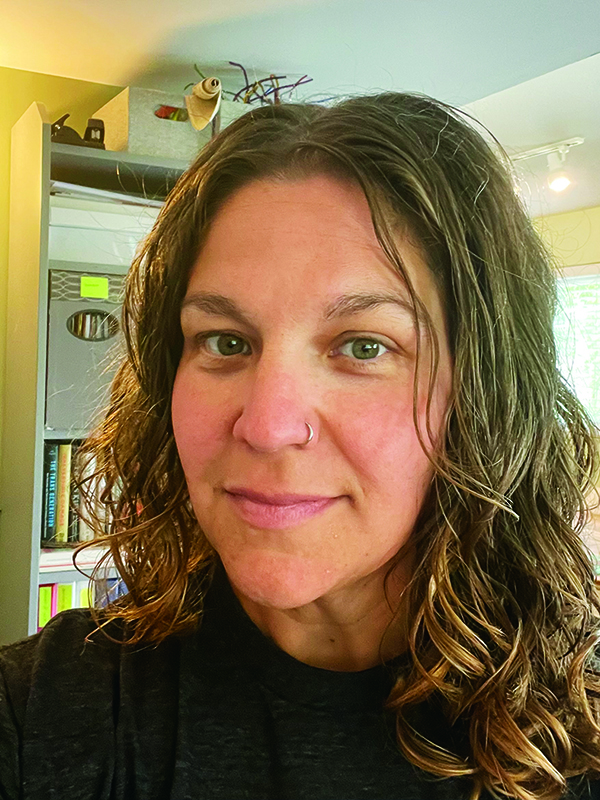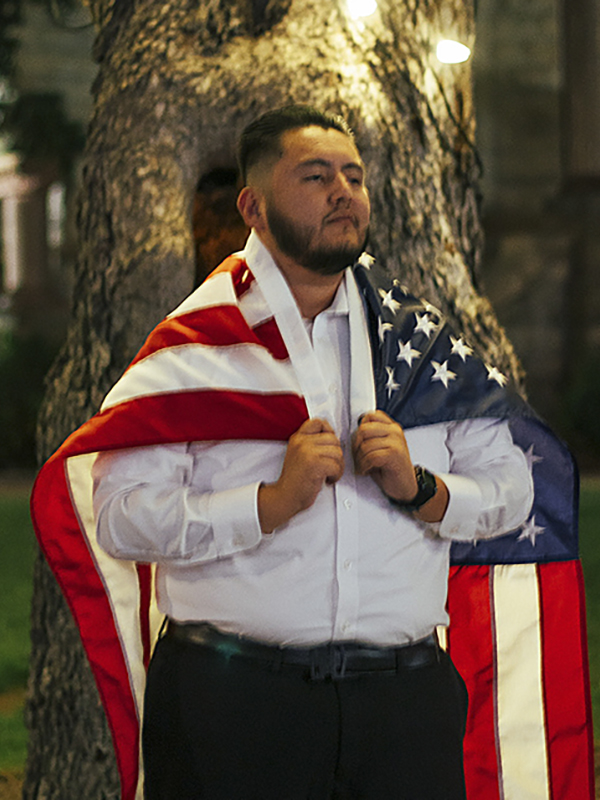Facts on Youth Gender Transition from FAIR in Medicine
FAIR in Medicine is a nonpartisan professional network dedicated to advancing the highest ethical standards in medical practice, and to promoting a common medical culture based on critical thinking and the pursuit of excellence in all medical endeavors.
Please read below to learn more about international research and policy on youth gender transition and stories of youths who have experienced medical transition. With the right knowledge, we can make better decisions on how to care for our vulnerable youths.
Clinical Experiences

Jamie Reed
Links
- I Thought I Was Saving Trans Kids. Now I’m Blowing the Whistle. The Free Press, Feb. 9, 2023
- How a Small gender Clinic Landed in a Political Storm, The New York Times, Aug. 23, 2023
- Affidavit of Jamie Reed
- Jamie Reed: “Every Ethical Line I Drew Was Walked On… We Are Hurting People”, Gender: A Wider Lens podcast, May 5, 2023
I am the whistleblower who formerly worked as the Case Manager and Research Coordinator in the Pediatric Transgender Center at Washington University School of Medicine at St. Louis Children’s Hospital. I hold a BA in Anthropology and an MS in Clinical Research Management. I served as the Case Manager in the Pediatric Transgender Center for over 4 years.
I became a public whistleblower after submitting a formal affidavit to the Missouri Attorney General which documents ethical, medical, and safety concerns regarding patient care at the center. These concerns were made public in “I Thought I was Saving Trans Kids, now I am Blowing the Whistle,”
published in The Free Press.
There had been whistleblowers in pediatric gender medicine in England. Hannah Barnes, a BBC journalist, wrote “Time to Think,” a book that exposed harms in the London clinic. I am the first public whistleblower from the United States pediatric gender clinic, and I have been attacked for seeking safe care.
Missouri passed a law that instituted a four-year moratorium on puberty blockers, cross-sex hormones, and surgery for anyone under 18 years of age. The bills were challenged in court but were upheld and implemented on August 28, 2023.
The New York Times completed an in-depth investigation titled, “Youth Gender Clinic Lands in a Political Storm,” published on August 23, 2023. The NY Times deemed my allegations credible.
On September 11, 2023, Washington University School of Medicine released notification that they would close their gender clinic and cease all puberty blockers, cross sex hormones, and surgical treatment in children and adolescents.
None of the detransitioners who shared their stories here were cared for at the St. Louis Children’s gender clinic. They were transitioned in North Carolina, Minnesota, Oregon, and California. These harms are occurring in many other gender clinics throughout the United States and the world.

Laura Becker
Links
I am a 26-year-old detransitioner. I was harmed by gender medicine and transition.
At 15, I discovered transgender identity online. I was validated and affirmed by my high school’s Gay Straight Alliance Club, my college LGBT Center, my peers, and my doctors.
I was diagnosed with autism, depression, anxiety, and polycystic ovary syndrome as an adolescent. I suffered chronic parental abuse. I fought suicidal ideation, substance abuse, and had PTSD flashbacks from past events in my life. I now know that I became gender dysphoric for these reasons.
I sought treatment for my gender distress. I was quickly approved for medical transition at 19. I injected testosterone weekly and had a double mastectomy that removed my healthy breasts. My mental health and suicidality continued, and I suffered further trauma while I was being transitioned.
At 22, I was finally properly diagnosed with post-traumatic stress disorder, and realized my gender issues were caused by abuse and psychological problems. Transition with hormones and surgery only worsened my physical and emotional well-being. It made everything worse. Testosterone and surgery were not only unnecessary, but they were harmful.
I detransitioned in 2019 and have been advocating for evidence-based gender medical care since, devoting my time and energy to writing and public speaking. My artwork and graphic design are another way I try to reach people. I want to educate young people, parents, and professionals. There are better ways to heal from trauma and psychological issues than transition.

Chloe Cole
Links
- Detransitioner Chloe Cole’s full testimony to Congress is a ‘final warning’ to stop gender surgery, New York Post, July 28, 2023
- Legal action may change transgender care in America, The Economist, March 7, 2023
- Why detransitioners are crucial to the science of fender care, Reuters, Dec. 22, 2022
I am a formerly trans-identified 19-year-old woman who began her gender transition at 12 years of age. I was prescribed puberty blockers and testosterone at 13 and underwent a double mastectomy at 15. I rejected transition at 16 upon realizing that I wanted to become a mother and have biological children as an adult and that my gender dysphoria was largely attributable to other psychiatric issues that my doctors had failed to address during the diagnosis and treatment of my gender dysphoria, including a body image disorder, sexual trauma, and being on the autistic spectrum.
Now, at 19, I have taken to speaking out about my experience that mirrors that of many others, and in opposition to the medical transitioning of children as well as the “gender-affirmative” model of care in favor of a more individualized, holistic approach to gender dysphoria.

Abel Garcia
Links
- Detransitioner Perspective: Transition was easy… Detransition was not, PITT Substack, August 17, 2022
- No Way Back: The Reality of Gender Affirming Care, 2023
- California Teen Tried to Escape Macho Mexican Culture through Medical Transition, National Review, August 18, 2023
I was raised in a Mexican household in California. From a young age, I was very quiet, reserved, and introverted, and I did not have much of a relationship with my father growing up. I was an effeminate boy and without my father’s presence I questioned my masculinity. Mexican culture embraces hypermasculinity, and I did not know if I could live up to that.
As a teenager, I discovered transgender people on the internet and started questioning myself and my masculinity again. I spoke with a therapist about my confusion and at my very first appointment I was approved to start transition. Sadly, after a traumatic sexual incident forced upon me by my own father in an attempt to “masculinize me,” I finally started my transition.
I was approved for both top and bottom surgery less than a year into my transition. I only accepted top surgery at the time, and not long after that, I realized that I had made a very big mistake. The next two years I spent dealing with regret and depression. I met with nothing but roadblocks to reverse the damage done to me. Damage done to me by people who were supposed to help me.
Today, I live in constant pain due to the hormones prescribed to me. Some of the issues that I deal with today are rapid loss of my eyesight, genital atrophy, possible sterility, and muscle spasms. I am unsure of all the harms I have sustained. I want to prevent others from going through what I went through.

Camille Kiefel
Links
- I Thought I Was Nonbinary. Now I help Detransitioners, Newsweek, July 31, 1994
- Oregon woman, 32, with long history of mental health problems now sues carers for green-lighting her double mastectomy gender change that was fast-tracked after brief Zoom sessions, Daily Mail, Nov. 7, 2022
- Trauma and Transition Trajectories: The Risk of Caenisian Reversion, Psychiatric Times, July 12, 2023
- The Gender Trap: a Detrans Story, Benjamin Boyce podcast, Jan. 24, 2023
- Detrans Help
Since the sixth grade, I have struggled with gender. My best friend was sexually assaulted, and I was traumatized by her experience. I struggled with major depressive disorder, generalized anxiety disorder, ADHD, and suicidal ideation. In 2010, a college woman’s studies course introduced me to non-binary identities. I began to believe a non-binary identity would bring me relief.
Years later I was still struggling and discussed nonbinary identities with my therapist. My therapist agreed with me and believed I was non-binary too. Medical doctors didn’t question my non-binary identity, even though there is no biological equivalent to it in the natural world. I was approved for transition and had a bilateral mastectomy. My healthy breasts were removed.
After the mastectomy, I developed Raynaud’s Syndrome, thermal dysregulation, tinnitus and easy bruising. My doctors listened to my concerns at first, but later became dismissive when I had fevers and told me my symptoms were all psychosomatic. They told me they could no longer help me and that I needed to see a therapist. I’ve already had 20 years of talk therapy and knew more talk therapy wasn’t the answer.
I took my health into my own hands, and perused a holistic approach, which included changing my diet. My mental health improved and I detransitioned shortly after. I realized I needed holistic care all along, and that my transition was an attempt to escape from trauma due to poor mental and biological health.
I filed a lawsuit against the two mental health professionals that enabled my transition. I have given testimony to numerous legislatures around the United States. I share my experience with gender affirming care and the harms from my transition. There will be serious problems in the coming years as many more people are harmed and regret what was done to them.
In 2023, I founded Detrans Help, a non-profit that connects detransitioners with medical and legal resources. Partnering with medical doctors, Detrans Help is building the first ever wellness protocol and advocating for medical care for detransitioners. It is also seeking to include detransition as a recognized medical code in the ICD-10. We work to amplify the voices of detransitioners, educate entities on our needs, and provide hope for detransitioners and those who care about them.

Prisha Mosely
Links
- The evidence to support medicalised gender transitions in adolescents is worryingly weak, The Economist, April 5, 2023
- Young North Carolina woman sues the doctors who put her on testosterone at age 17, saying she needed therapy, not a double mastectomy, in latest blockbuster ‘detransition’ lawsuit, Daily Mail, July 18, 2023
- Prisha, X (formerly Twitter)
As an adolescent, I had physical traumas and suffered from anorexia. On a social media website for people with anorexia I expressed my discomfort with puberty and my female body. It was suggested that I might be transgender, and I began to visit Internet sites for youth with gender dysphoria.
At 15 I identified as transgender and began hormonal transition at 16. Testosterone was injected into my anorexic body. I gained about 100 pounds, and doctors thought they had cured my eating disorder. At 18, my healthy breasts were removed. When the surgeon removed my breasts, I asked him to do liposuction at the same time but was told my active psychological problems did not make me a proper candidate for liposuction. However, it was okay to remove my breasts.
Therapists and doctors promised me that my psychological conditions and trauma would all be cured if I allowed them to make my body look like a boy’s body. This wasn’t true.
Now, I suffer from a host of medical and emotional damages. My body was never allowed to properly develop and grow. While being treated with hormones and surgery, my mental health problems went unaddressed, and my physical health was stolen. I work as an advocate on legislation and on the personal level, trying to save others from the preventable tragedy of gender affirming care. No one should suffer the pain and disfigurement I suffer with today. I filed the first lawsuit of its kind in North Carolina.
Media
International Policy on Youth Transition
In 2014, Dutch researchers published their experience transitioning 55 youth with gender dysphoria. This paper is the foundation on which youth transition was built. In less than ten years, hormonal and surgical transition of teenagers and young adults spread across Europe, the US, Canada, Australia, and New Zealand.
European countries began to report poor outcomes, patient regret, and harms. European health authorities conducted systematic evidence reviews that found very low quality evidence that transition benefits youth. The Dutch reports were not holding true when transition became mainstream and part of general medical practice.
European countries are changing national health policy for youth with gender dysphoria for safety and ethical reasons. The links are primary sources for what is written here.
Finland
Finland started transitioning youth in 2012. They quickly learned that their youth did not benefit. Their experience was very different from what the Dutch reported. Most youth had co-morbid mental health issues, and transition often worsened these problems. Finland was the first country to do a systematic evidence review, and national policy changed in 2020. Finland’s primary treatment for gender dysphoria is now psychological support.
Sweden
Sweden is one of the most progressive countries in the world. In 1972, it was the first country to allow people to change their legal sex.
A 2011 Swedish paper reported outcomes of adult transition. This was a population-based study of all adults transitioned from 1972 to 2002. No one was lost to follow up. After adults transitioned, long term physical and mental health outcomes were compared to aged-matched peers in the general population.
Sweden found that after transition adults had an
- increased risk of cardiovascular death,
- 3 times higher rate of psychiatric hospitalization,
- higher overall rate of mortality, and
- mortality after transition was particularly high due to suicide.
Sweden’s systematic review concluded that the evidence for benefit after youth transition to be low quality. In 2022, Sweden’s National Board of Health and Welfare (NBHW) concluded that “the risks of puberty suppressing treatment … and gender-affirming hormonal treatment currently outweigh the possible benefits.”
Sweden determined that change was needed because 1) the scientific evidence for benefit of is lacking, 2) the harms are real, 3) there are increasing reports of regret and detransition, and 4) the dramatic increase in youth seeking transition is unexplained. This increase particularly effects natal females. For these reasons, Sweden’s national treatment policy is changing. It emphasizes psychological care and will restrict youth transition to experimental protocols.
England
In September 2020, England’s National Health Service commissioned Hilary Cass to conduct an independent review of their youth gender services. Dr. Cass is the former president of the Royal College of Pediatricians, England’s equivalent of the American Academy of Pediatrics. In October 2020, England’s National Institute for Health and Care Excellence (NICE) published systematic evidence reviews for puberty blockers and cross sex hormones. They found the evidence of benefit to be of very low certainty.
In 2022, NHS announced it is closing the gender clinic, to be replaced by regional centers that emphasize a holistic and psychological approach to treating gender dysphoria. Puberty blockers and cross sex hormones will only be available in research protocols that are yet to be designed. Youth transition outside of research will only be considered in “exceptional cases” that will need approval by a national multidisciplinary team.
Norway
In March 2023, Norway’s independent Health Care Investigation Board (UKOM) recognized that children and youth are not “fully developed physically, mentally, sexually and socially.” They made three recommendations.
First, a national policy is need that is based on a systematic review of the evidence. Second, hormonal and surgical transition be defined as investigational, or experimental. And third, a national registry is needed to oversee quality and ensure patient safety.
Norway health leadership acted because patients and families were dissatisfied with youth transitions. Harms, regret and detransition was occurring and action is needed to protect patient safety.
Denmark
In July 2023, it was acknowledged that Denmark had quietly changed policy and now emphasizes psychological care over transition of youth. Access to transition has been greatly restricted. Denmark has the same concerns as other countries.
At its peak in 2018, Demark transitioned 65% of youth that presented to their gender clinics. In 2022, only 6% of youth were treated with the medical model of care.
France
France’s National Academy of Medicine has expressed the same concerns as their fellow European countries.
Belgium
Belgium’s medical leadership has stated the evidence for youth transition is weak, the quality of current standards of care are poor, and youth transition is an experiment. The leadership of Belgium’s Center for Evidence Based Medicine (CEBAM) is seeking care reform and changes are in works.


